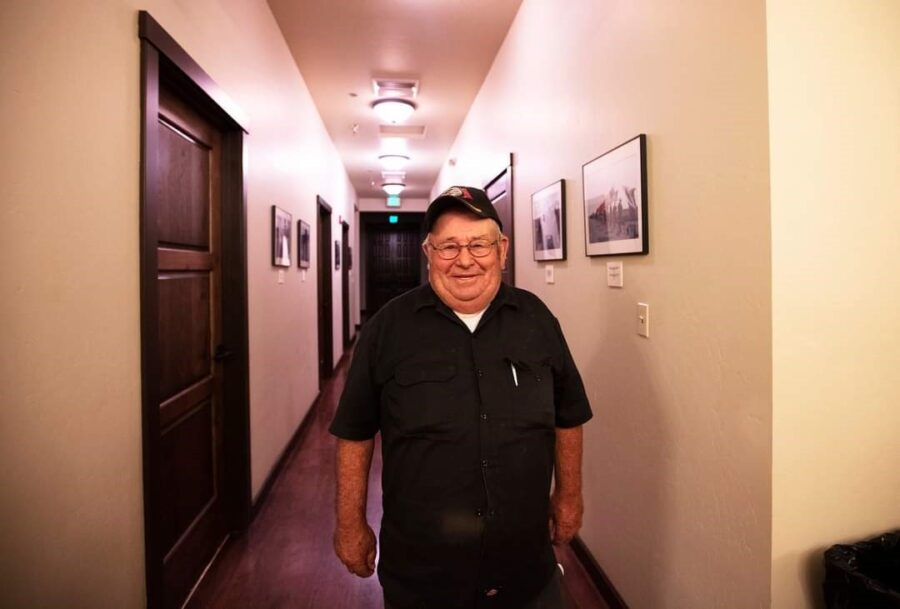
We learned with sadness about the passing of Mario Vargas, whose love for the farm worker movement led him to dedicate his life to La Causa and to become one of the longest serving staff members at the National Chavez Center, movement headquarters at La Paz in Keene, Calif. Mario, 80, passed away on Tuesday, January 23 in Bakersfield.
He was one of 10 children of Angelino Vargas and Maria Costa, born in 1943 on the island of Faial in the Azores, where he grew up until age 24. The family immigrated to the United States in 1967, fleeing destruction from a volcanic eruption. Mario and his brother Norberto quickly went to work in Livingston, Calif. at E&J Gallo wine grape vineyards, a huge company with many Portuguese workers. They soon met Cesar Chavez, Dolores Huerta, and Roberto De La Cruz as they organized Gallo workers and explained their United Farm Workers contract. Union organizer Aggie Rose, who was also Portuguese, translated for the workers.
Mario served as a union steward at Gallo, helping enforce the UFW contract and defend workers from mistreatment. After their UFW contract was arbitrarily turned over to the Teamsters by Gallo in 1973, both Vargas brothers walked out on strike and spent months on picket lines. They were arrested and jailed with many other strikers for violating anti-picketing injunctions—among 3,500 nonviolent strikers behind bars across the Central Valley that summer. “We went through hell,” Norberto recalls, “but we were young and full of energy.”
Cesar Chavez sent Mario and Norberto Vargas to San Francisco to boycott Gallo wines, grapes, and lettuce. They worked with both Fred Ross Sr. and Jr. and were jailed again while picketing supermarkets.
Mario and Norberto returned to Livingston in September 1975 to vote for the UFW at Gallo in one of the first elections under the historic California farm labor law. Mario stayed with the union, joining a team of organizers helping farm workers organize throughout the state. “Mario was an effective organizer, strong and fearless—when there was a lot to be fearful about,” affirmed UFW President Emeritus Arturo S. Rodriguez. “Workers respected Mario.”
Mario took part in most major UFW organizing, boycott, and political campaigns, traveling across the state.
Eventually settling at movement headquarters in La Paz, Mario was part of the team that cared for the grounds there and at the movement’s “Forty Acres” facility in Delano. He supported building or renovating the Visitor Center and Memorial Garden at Keene, now part of the Cesar E. Chavez National Monument. He later performed the same duties when the Villa La Paz Education and Conferencing Center (the old North Unit) was extensively renovated. When union families got new assignments, Mario would show up with a truck to help them move. Cesar Chavez Foundation Board of Directors Chair Paul F. Chavez recalls Mario helping move him at least five times.
More recently, he spent years on security and patrolling La Paz, particularly at night. He remained living on the grounds. After Cesar died in 1993, he took special care protecting the grave site. Mario and Norberto reunited during those years as they worked security and performed other duties at La Paz and the Forty Acres.
Mario committed his life to the farm worker movement. “We used to talk,” Norberto noted, “and Mario would say, ‘I love the union. I’m not going anywhere. I’m staying with the union.’ The union was in his heart,” Norberto added. “Mine too.”
“Mario was a constant presence at La Paz for decades,” Paul Chavez said. “Succeeding generations of movement activists who knew him were inspired by his example.”
A very private man, Mario never complained, even as his health declined.
Mario Vargas is survived by eight of his siblings: Maria, Angelino, Rufino, Gabriela, Norberto, Edwina, Thelma, and Roy. Another brother, Armando, preceded him in death.
Services are pending.
